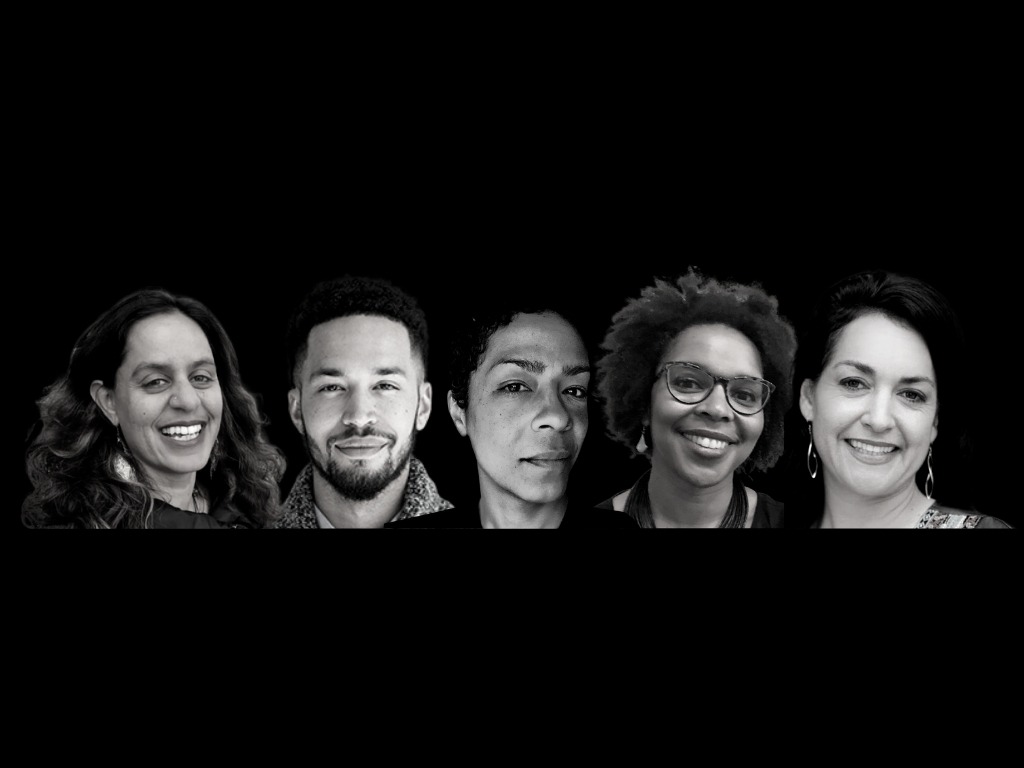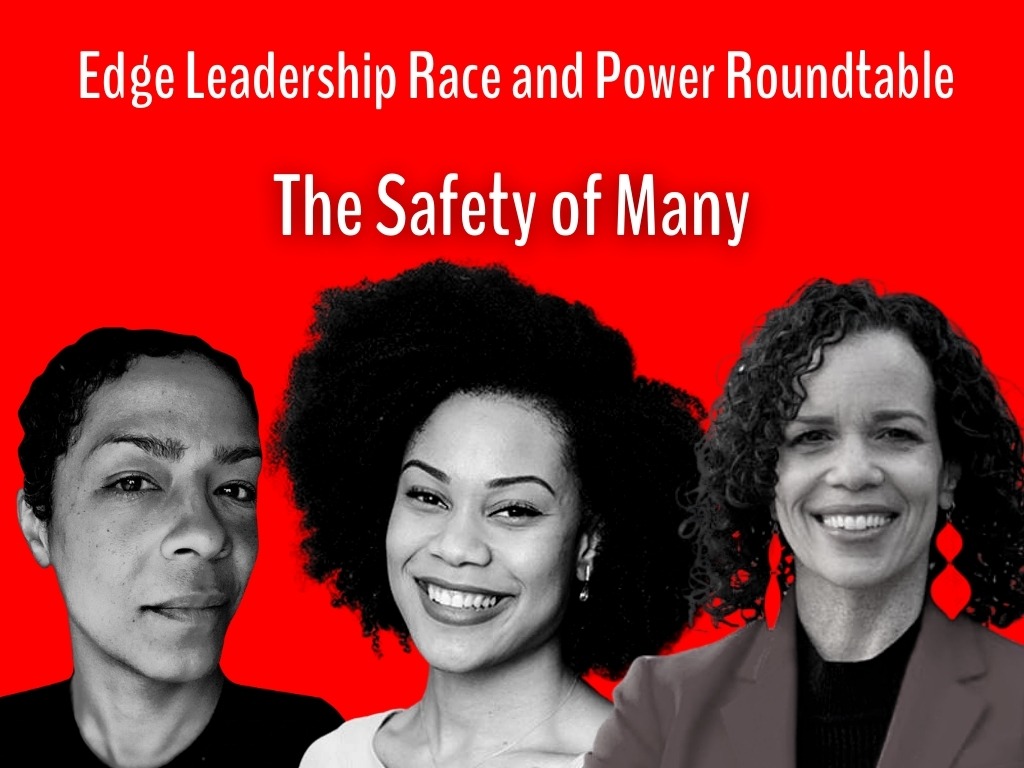Edge Leadership hosted a Race and Power Roundtable. In this clip, Kelly Bates, Angela Romans, Kad Smith, Anastasia Tomkin, and Monna Wong share their thoughts on the state of power in the US.
Kelly Bates: We’re in a battle for power. I don’t know how to contextualize it or describe it, but it’s clear that white folks in the Capitol, and around, and in places feel like they are losing their power or lost the power, and they’re going to take it back through force and domination and overturning the Capitol. And, frankly, what we understand, they were trying to do a revolution. I mean, that’s what was trying to happen, they were trying to make happen a civil war. There is a contest over power. Not sure our side would say that, you know, that’s how we look at it. But I do think that’s what’s happening.
Angela Romans: To build on that, Kelly, I feel like, yes, it is. I was gonna say, “What is the state? Conflict.” That is the state of race and power right now—and physical conflict right now, as we can see, although lots of conflict that is not physical. Very emotional. And it is conflict, because there are lots of wins on our side. And I feel like last week—was it last week?—I kept saying, “What a week we have had!” Right? It had been like this, and I want to acknowledge the wins, right? So, Georgia, and the power of black folks, black women who’ve been organizing around voting for years, and the fruits of that that people can see. So, it is conflict. I think there are…part of the state is that there are more people of color in this country—more and more people of color in the country—and therefore the numbers are shifting, and then the backlash is huge and violent in response. So, I think I would echo everything Kelly said and say that the conflict is because there are some clear wins on the side of right, and the backlash against that.
Kad Smith: Good to see y’all’s faces as well. I’ll say that, the state of race, I think the global majority has successfully started to articulate just the impact of race as a construct in ways that we’ve never seen before. So, things like technology, things like access to information, have allowed for that kind of permeation of a colorblind society to not be able to continue. And I think that there are some things in pop culture, across both the US context but even across the world, by power brokers who wanted us to believe that that was true—that race no longer matters, that racism is a thing of the past, that the institutions that upheld it have eroded and are no longer significantly doing so. And we basically said, “bullshit.” And the global majority has been very successful—by which I mean people of color across this world—in saying, “No, the impact is still very much still felt, and I can point you to a thousand ways where I see it every day, and you no longer have the privilege of not listening.” So the state of race, I think, is evolving in that regard.
Sign up for our free newsletters
Subscribe to NPQ's newsletters to have our top stories delivered directly to your inbox.
By signing up, you agree to our privacy policy and terms of use, and to receive messages from NPQ and our partners.
And I think as it pertains to power, it’s a similar thing that’s happening. I—eh, maybe I’m naive because of this, I’m still maturing—I believe that there are a lot less nefarious and kind of [finger quotes] “evil people” in the world than there are people who genuinely just want to live to see another day. There are the [finger quotes] “power brokers” who have nefarious goals, nefarious attempts that they would like to put out to maintain their power structures. And then there are those of us who just, again, want to see our communities flourish, want to see people have a good chance at life, who actually do have compassion more close to us than self-interest. And so the power brokers…I feel like, the state of power in our work is really starting to identify: where is power being monopolized? Where is power being hoarded? And to speak plainly about why that has to change—specifically when we say we want to be collaborative, specifically when we say we want to be equitable. So the state of power in our work is we’re just starting to speak more plainly about how we’re experiencing it, and how things need to shift if we actually do want to get to this world where it feels like the things we say we want are possible.
Anastasia Tomkin: Yeah, I totally agree with Kad that, you know, these conversations are being had, they’re bubbling up, like, almost reaching a crescendo. It’s just, it’s everywhere you look, right? Which is encouraging, and we have to also focus on the good and not the whole road ahead of us. But for me, you know, working in the justice system and seeing it close up, and also hearing about, like, all of the different police brutality cases that happened last year, and the not-so-great outcomes after all of these months of organizing and protesting, I think, for me, it shows that the foundation of the justice system is what really, really needs to change. And I think there’s still a lack of really viable solutions coming forward about how to change that. Like, there’s overt white supremacy and the Klan’s folks, and then there’s, like, what we’ve been accustomed to accepting. So, I think that the road ahead, it seems sort of bright, but it’s also, you know, we can’t lose sight of the fact that there’s still this web, especially as it relates to the policing and the justice system, that we have to unravel and figure out.
Monna Wong: I can’t talk about or think about race and power without also thinking about self-determination. When I think about the struggle over power—going back to Kelly, your original point—I feel like I sensed a hesitation when you were like, you know, “Our side isn’t necessarily fighting for that.” And I think what our side is not fighting for is power over others. We’re fighting for the ability to self-determine for ourselves. That’s why we organize, and we’re building power for our communities so that we can determine our outcomes.
I think what I experienced, what I have observed about how white supremacy has reared its head just in the last year is actually a collective display of grief. As a parent of a toddler, sometimes I feel like I’m just witnessing a huge temper tantrum on a mass scale. It’s like the same as when I tell my kid that she, like, can’t have another cookie. It feels like I’m just witnessing her grief about not being able to have another cookie. And not to trivialize the impact, of course, of white supremacy and violence on our communities, but also I think that what we’re seeing is people who are just devastated by the fact that their power over others is being challenged. I do believe that we are winning. What we’re winning is the ability to have [and] to practice self-determination.
Edge Leadership began in 2020 with a series of in-person and online convenings. This article and multimedia story series features the thinking of Edge Leaders. Follow these talented, sector-crossing, forward thinking social change agents at @EdgeLeadership2020 on Instagram, via NPQ’s channels, and by joining our closed 500-seat platform experiment.












